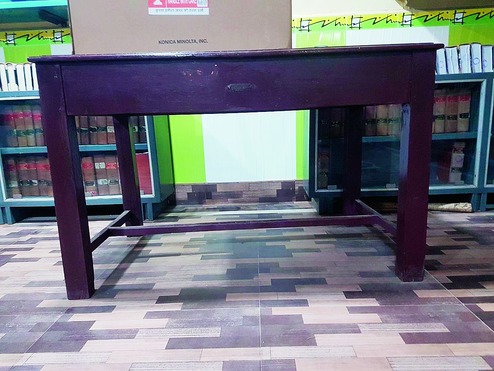
Berhampur: The table, on which the body of Srikakulam resident Kuree Nukaraju had been chopped into seven pieces by Pakala Narayan Swami of Berhampur in 1937, would be preserved at the High Court Museum here.
"The sensational murder case has now become a subject for law students the world over. The truth could have remained buried for want of evidence but was ultimately cracked by a British judge Justice Atkin. It is for this reason that this table is also more important to preserve it as a token of remembrance," Ganjam Bar Association secretary Pitabas Panda said.
The table is now kept at the library hall of the association.
Justice Atkin had displayed enough judicial prudence and sent Pakala Narayan Swami behind the bars on the basis of circumstantial evidence and the statements of two persons as there was no eyewitness to the case.
According to the case diary, on the noon of March 23, 1937, the deceased's body was found in a steel trunk in a third class compartment of a train in Puri, the terminus of a branch line on the Bengal Nagpur Railway, where the trunk had been left unclaimed.
The body had been cut into seven pieces, and the medical evidence left no doubt that the man had been murdered. The deceased's body was identified by his widow. He was about 40 years old and had been a peon in the service of the dewan of Pithapur, one of whose daughters was the accused's wife. The deceased left his house on Sunday, March 21, to catch the train to Berhampur. On Tuesday, March 23, his body was found in the train in Puri.
Inside the trunk, were written the words "Victoria Market, Berhampur". The police rushed to Berhampur and inquired about the buyer of the trunk from shops at Victoria Market. During inquiry, a trader admitted to have sold the trunk to Narayan Swami.
In 1919, the accused and his wife had got married and started living in Berhampur, about 400km from Pithapur. In 1933, they returned to Pithapur where the couple appeared to have stayed with the dewan. It seemed that at that time, they were in need of money. In 1936, the accused's wife had borrowed an amount of Rs 3,000 at an interest rate of 18 per cent per annum from the deceased.
The police arrested Swami, his wife and brother-in-law and produced them in court. However, the Chhatrapur sub-divisional magistrate court refused to admit the case for hearing as there were no witnesses to the incident and acquitted all the accused on January 19, 1939 for want of evidence.
Thereupon the Berhampur sessions judge, exercising his powers under the Code of Criminal Procedure, called upon the accused to show cause why they should not be committed for trial. In July, 1937, he had ordered the accused, Pakala Narayan Swami, and his wife to be committed to the Court of Sessions Judge to stand their trial for offences under sections of the Indian Penal Code 120B (conspiring to murder) 302 (murder) and 201 (causing evidence of an offence to disappear).
At the trial, the sessions judge acquitted the appellant's wife of all the charges but convicted the appellant of murder and sentenced him to death.
Distress call
Director-general of police Rajendra Prasad Sharma on Wednesday visited the district and said all police stations in and around Balasore town would be integrated to bring an effective mechanism towards distress call (dial 100 number). This would help reduce the response time and deliver a better monitoring scope.










